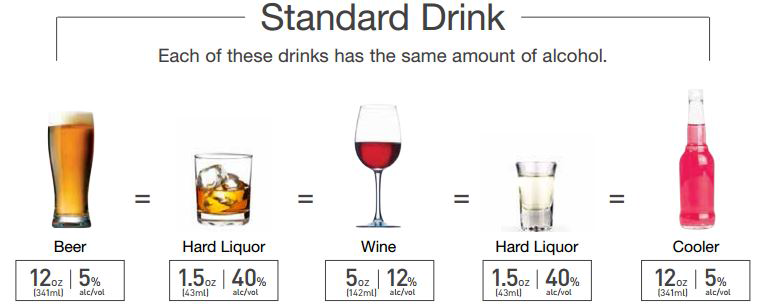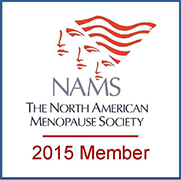Frequently Asked Questions
There are 3 kinds of alcohol drinkers:
Moderate (Low Risk)
• 7 drinks per week
• No more than 3 per day
Heavy (At Risk)
• More than 7 drinks per week
• More than 3 per day
Binge Drinking
• 4 drinks within 2 hours

Heavy drinkers (7 drinks/week or >3/day) are at risk for:
• Heart disease
• Stroke
• Obesity
• Depression
• Type 2 diabetes
• Certain cancers, including breast, mouth, liver, and esophageal cancer
Did you know?
• Women are 50%-100% more likely to die from alcohol-related disorders than men
• Nearly 50% of prescription drugs commonly taken by mid-life women can interact with alcohol
• 52.8% of men and 37.2% of women over age 60 currently drink at least some alcohol
• Drinking 1 drink/day can lower your risk for heart disease, type 2 diabetes, dementia, obesity, and stroke
• People who drink moderately (7/week with no more than 3/day) have stronger bones than non-drinkers
• Wine provides more benefits than other types of alcohol
How do I know if I have a problem with alcohol?
• After drinking, have you ever noticed an increase in your heart rate or beating in your chest?
• When talking with others, do you ever underestimate how much you actually drink?
• Does alcohol make you sleepy so that you often fall asleep in your chair?
• After a few drinks, have you sometimes not eaten or been able to skip a meal?
• Does having a few drinks help decrease your shakiness or tremors?
• Does alcohol sometimes make it hard for you to remember parts of the day or night?
• Do you have rules for yourself that you won't drink before a certain time of the day?
• Have you lost interest in hobbies or activities you used to enjoy?
• When you wake up in the morning do you have trouble remembering the night before?
• Does having a drink help you sleep?
• Do you hide your alcohol bottles from family members?
• After a social gathering have you ever felt embarrassed because you drank too much?
• Have you ever been concerned that drinking might be harmful to your health?
• Do you like to end an evening with a nightcap?
• Did you find your drinking increased after someone close to you has died?
• In general, would you prefer to have a few drinks at home rather than go out to social events?
• Are you drinking more now than in the past?
• Do you usually take a drink to relax or calm your nerves?
• Do you drink to take your mind off your problems?
• Have you ever increased your drinking after experiencing a loss in your life?
• Do you sometimes drive when you have had too much to drink?
• Has a doctor or nurse ever said they were worried or concerned about your drinking?
• Have you ever made rules to manage your drinking?
• When you feel lonely does having a drink help?
* MAST-GV screening tool by Joseph, Ganzini, & Atkinson (1995)
A score of 5 or more "yes" responses indicates a potential alcohol problem and suggests the need for further assessment. Consider talking to your doctor if you scored more than 5.
How do I modify my alcohol intake?
Deciding to cut back or quit drinking completely is a choice that some people find easier than others. Here are some tips and tricks that can help you make a plan to modify your drinking habits:
• Weigh your pros and cons
• Keep track of how often you drink
• Ask for support from friends, family, or a health professional
• Pace yourself when you are drinking – sip slowly
• Allow every second drink to be non-alcoholic, like water
• Don’t drink on an empty stomach
• Find new activities or hobbies to occupy your time
• Avoid the triggers that make you turn to drinking
• Find distractions when you have the urge to drink
• Decide to say “no” when offered a drink
Resources
• Learn about counting alcohol calories, your personal alcohol pattern, and much more at http://rethinkingdrinking.niaaa.nih.gov
• Contact HealthLine at 811 and ask to speak to an Addictions or Mental Health Counsellor
• Get in contact with someone from Alcoholics Anonymous by calling 306-665-6727 or visit their website at http://www.aasask.org
• Call the Saskatoon Health Region’s Mental Health and Addictions Services at 306-655-7777 if you have questions
• Check to see if there are mental health and addictions services near you
• Talk to your doctor if you need help starting!
References
Goldstein, N., Hodgson, N., Savage, C., & Walton-Moss, B. (2015). Alcohol use and the older adult woman. Journal of Nurse Practitioners, 11(4), p.436-442.
Joseph, C., Ganzini, L., & Atkinson, R. (1995) Screening for alcohol use disorders in the nursing home. Journal of American Geriatric Society, 43, 368–373.
National Institute on Alcohol Abuse and Alcoholism. (2016). Rethinking drinking: Alcohol and your health. Retrieved from http://rethinkingdrinking.niaaa.nih.gov/Default.aspx
North American Menopause Society (2016). Drink to Your Health at Menopause, or Not? Retrieved from http://www.menopause.org/for-women/menopauseflashes/exercise-and-diet/drink-to-your-health-at-menopause-or-not
Stevenson, J. (2005). Alcohol use, misuse, abuse, and dependence in later adulthood. Annual Review of Nursing Research, 23245-280 36p.
Created by Katie Cotter for:
The Women’s Mid-life Health Program
Saskatchewan Collaborative Bachelor of Science in Nursing. March 2016
Improving Women's Lives Through Better Health in Mid-Life and Beyond


